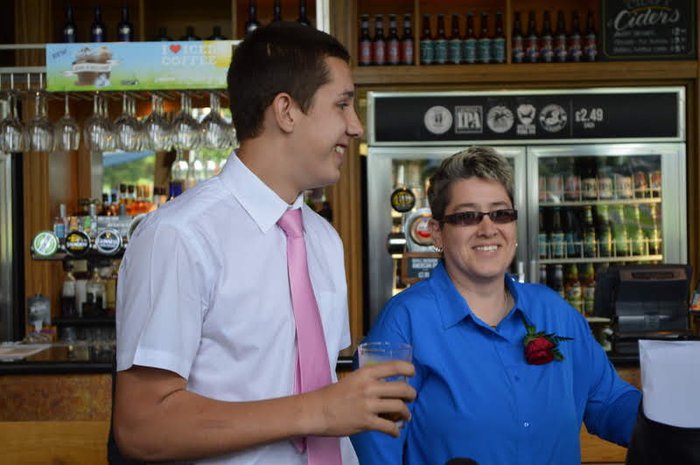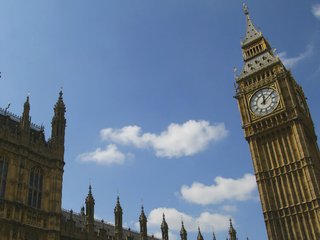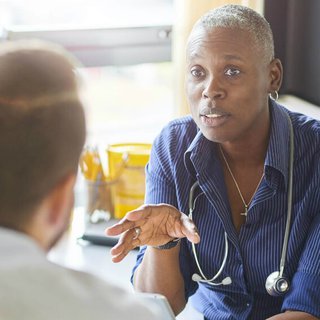The pool of uncertainty
Angie explains her mounting worries and anxieties about the impact of coronavirus. Like many people with blood cancer, she feels forced to neglect her health to earn money, and return to a workplace where she doesn't feel safe.

I used to get sore throats, which lasted for 24 hours, occurring every other day for many years. My GP at the time kept telling me I had hay-fever, 12 months of the year. I finally changed my GP surgery. In 2016, after getting two lots of gout in my big toe, sharp stabbing pains, horrific night sweats and continuous sore throats, I visited my GP.
I was sent for blood tests, which showed my white blood cell count was high. After eight weeks, I had a full blood count test, which showed that my white blood cell count was higher. I was then sent to the haematology department for further investigation.
I was told on the first appointment that there was a small chance I had chronic myeloid leukaemia (CML), but due to my age – being 44 years old – he was pretty sure it wasn't CML
I thought he was very wrong about leukaemia.
After all, I thought people with leukaemia were very ill – I wasn’t ill, I had a job, where I was expected to walk 11 miles a day. I was also cycling 26km a day.
Six weeks later, I was diagnosed with CML. Within five days, I had a bone marrow biopsy and was told to take Imatinib – the ‘magic drug’. I was off work for six months. When I returned, I could barely walk two miles. I went from cycling 26km to doing just five minutes – if I was lucky, due to the fatigue.
A new start
I started a new job as a swimming teacher in January 2020. I was looking forward to a new start, with part-time hours and a more manageable job. Then April and COVID-19 hit. I was shielding, like many other people between April to August. Then shielding was paused.
I was really worried about returning to work
The day the leisure centres (where I worked), should've opened, a nearby town had such a huge rise in coronavirus cases, the centres remained closed for two more weeks. Now, I was even more worried about returning to work.
I told my manager that I was worried about returning and initially they were quite understanding. I was given until the end of August to remain furloughed. Then, I would have to return to work.
Everyone is going back to work, why can’t you?
With schools returning, coronavirus cases on the rise again, Blood Cancer UK released information on the effect of coronavirus and blood cancer. Again, I was extremely worried about returning to work.
This time, my talks with the management team were not good. I was basically told that if I don't return to work at the end of September, then don't bother. I ended up taking three weeks of unpaid leave and my GP signed me off work for a month.
What has really surprised me are the responses I got from both my GP and haematology consultant. When I asked if it was safe for me to go back to work, both responses were, "well, everyone is going back to work, why can't you?" After I said, "yes, but not everyone has blood cancer," my consultant told me to go back to work, just don't go in the pool.
So... I can't go swimming as it’s not safe for me. Yet, it’s safe enough to work where it’s not safe?!!
I can't afford to give up work. So, recently, I returned to my safe yet unsafe place of work.
Today, a child struggled in the pool and I couldn't help him. I have to touch equipment that numerous children have touched and bitten. Yet, apparently, it’s safe enough for me to do that, but not safe to swim!
The Government, haematology consultant and GP have all said it’s not safe for me to go to the gym or swim – unless I work there.
I feel sad and angry that I've been put in the position of neglecting my health to earn money.
I don’t think I’ve ever truly accepted the limitations that CML and imatinib have forced upon me, and this pandemic reinforces these limitations. I also feel very lonely. The attitude from those I’ve asked for advice have reinforced my thoughts of being alone and no-one around to help.
Very recently, I rang Blood Cancer UK. Just to talk. I'm so grateful to the lady at the end of the phone who was willing to listen and not give me a hard time. Nor make me feel even more lonely and scared.
Thank you, Blood Cancer UK, for all that you do.

Support our campaigns
We campaign for changes that will improve care and treatment for people with blood cancer and help stop blood cancer happening in the first place.

